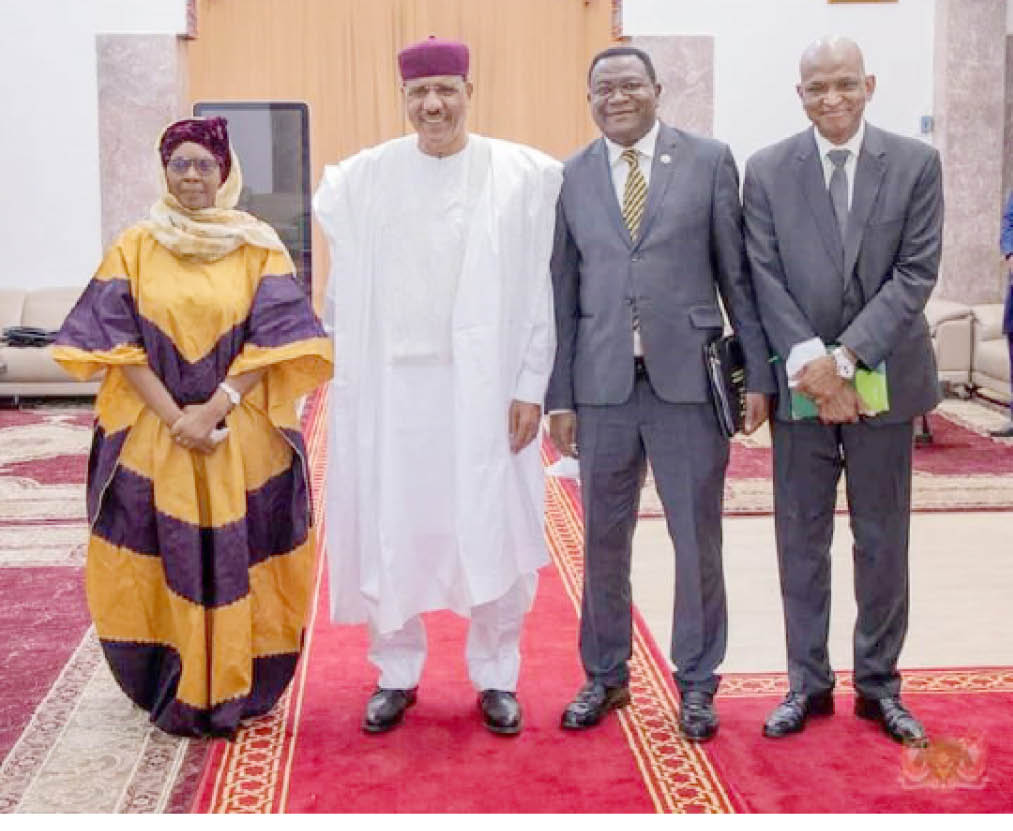More countries deposit declarations with African Court
The efforts of the African Court on Human and Peoples Rights to popularize itself received more boost in the week when Niger and Guinea Bissau deposited their declarations to the court. A declaration of the court is an instrument of ratification of Article 34(6) of the Protocol of the African Court which allows individuals and […]

President of the African Court on Human and Peoples’ Rights, Lady Justice Imani Aboud Daoud (L) and other officials of the court with the President of Niger Republic, Mohammed Bazoum during the visit to the country
The efforts of the African Court on Human and Peoples Rights to popularize itself received more boost in the week when Niger and Guinea Bissau deposited their declarations to the court.
A declaration of the court is an instrument of ratification of Article 34(6) of the Protocol of the African Court which allows individuals and non-governmental organisations to access the court directly.
Other states that have declarations in effect are Burkina Faso, The Gambia, Ghana, Malawi, Mali and Tunisia.
The protocol was adopted on June 9, 1998, in Burkina Faso and entered into force on January 25, 2004. The court began its operation in November 2006 following the election of the first judges.
The latest declarations had come as a result of the visits by the President of the Court, Lady Justice Imani Aboud Daoud, to Niger and Guinea Bissau between October 21 and 23 in which time they visited President Mohammed Bazoum of Niger in the capital, Niamey, which was followed by the country’s deposit at the African Union Commission in Addis Ababa, Ethiopia on October 28.
Representative of Guinea Bissau, Almara Quessangue, deposited the country’s declaration on November 3 in Dar Es Salaam, Tanzania.
The president of the African Court commended Guinea Bissau for the declaration, stating that it will go a long way towards enhancing confidence in the court and ultimately the protection of human and peoples’ rights in Africa.
Highlighting the purpose of the court’s visit to Niger, Lady-Justice Aboud stated that “after its long-standing commitment made by ratifying the court’s protocol, it is high time that Niger filed the declaration recognising the jurisdiction of the court to entertain cases brought by individuals and NGOs”.
It was during the visit that President of the Republic of Niger, Mohamed Bazoum, reiterated his country’s strong commitment to the protection of human rights and to the mandate of the African Court on Human and Peoples’ Rights as the only continental judicial body of the African Union (AU).
In echoing this request, the president of Niger pledged to consider all processes towards the filing of the declaration in a bid to affirm Niger’s human rights credentials and foster its participation in regional integration.
Meanwhile, the court commenced its 63rd ordinary session in Dar Es Salaam on Monday, November 8 until December 3. During the period, it will hear applications by parties across Africa and deliver judgements on December 2.
At the opening of the 5th Judicial Dialogue of the court, which preceded the ordinary session, the president observed that judicial independence cannot be assessed and debated outside “non-legal parameters such as sociology, psychology, idiosyncrasy and even religion.”
“A second observation I would like to make is that, in the justice system supervised by the African Charter and the African Court, there is a legal wealth that interpretation can tap into. The legal sphere in Africa is indeed characterized by diversity.
“Member States of the African Union implement different legal systems, different structures and organization of the judiciary, and different oversight schemes when it comes to supervising the operation of the judiciary. When adjudicating judicial independence, contextualization demands that this mosaic of factors be kept in mind to avoid an out of context judicial law-making.
“My third observation relates to judicial dialogue as a standalone dynamic. As this 5th Judicial Dialogue discusses questions of efficiency and effectiveness of the judiciary, there is no better time to recall that the principles of complementarity and subsidiarity apply to any debate on judicial effectiveness.
“As some of you might be aware, the bulk of the cases that make their way to the African Court arise from and relate to proceedings in domestic courts. So, in a sense, adjudication activity in regional judicial bodies, including the African Court, revolves around the assessment of the effectiveness and efficiency of national judicial systems.
“In discussing this topic, I, therefore, invite you to bear in mind that judicial dialogue will only make sense if national judiciaries are rendered more effective to make complementarity of justice more pertinent to the protection of human rights in Africa.”
Since its inception, the court has been confronted with challenges of the enforcement of its judgements and decisions among member states and its independence as it seeks non-interference from state parties and other interests.
